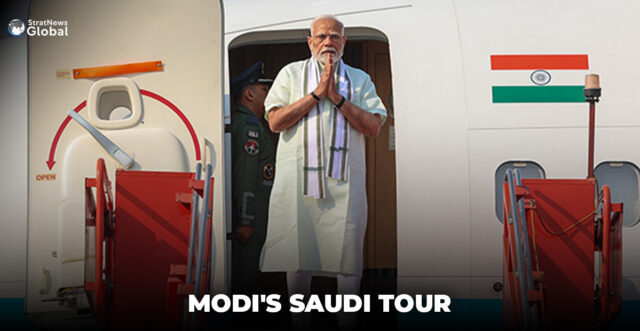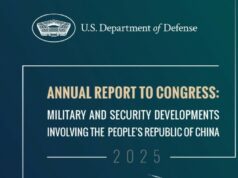Prime Minister Narendra Modi will embark on a visit to Saudi Arabia from April 22 to April 23 at the invitation of Prince Mohammed bin Salman, Crown Prince and Prime Minister of the Kingdom of Saudi Arabia.
This will be the third visit of the Prime Minister to the Kingdom after his previous visits in 2016 and 2019.
“The visit follows the State Visit of His Royal Highness Prince Mohammed bin Salman, Crown Prince and Prime Minister of the Kingdom of Saudi Arabia to New Delhi in September 2023 to attend the G20 Summit and co-chair the first meeting of the India-Saudi Arabia Strategic Partnership Council,” read a statement issued by the Indian government.
India-Saudi Arabia Ties
India and Saudi Arabia share close and friendly ties with a long history of socio-cultural and trade contacts.
As strategic partners, the two countries share strong bilateral relations across various areas, including political, defence, security, trade, investment, energy, technology, health, education, culture and people-to-people ties.
India’s relations with the Kingdom have evolved into a stronger and enduring partnership in the past decade, expanding into many strategic domains, with growing investment commitments, broadening of defence cooperation and intensive high-level exchanges across sectors.
The visit of Modi reflects the importance India attaches to its bilateral relationship with the Kingdom of Saudi Arabia.
“It will provide an opportunity to further deepen and strengthen our multi-faceted partnership, as well as to exchange views on various regional and international issues of mutual interest,” read a statement issued by the Indian Ministry of External Affairs.
Diplomatic relations between the two nations were established in 1947.
Delhi Declaration
The historic visit of King Abdullah to India in January 2006 was a watershed moment that resulted in the signing of the ‘Delhi Declaration’.
It was followed later by the ‘Riyadh Declaration’ in 2010 during the visit of ex-Prime Minister Manmohan Singh to the Kingdom, which elevated the bilateral relations to a Strategic Partnership.
“The visit of Hon’ble Prime Minister Shri Narendra Modi to Riyadh in April 2016 led to an enhanced and comprehensive cooperation in the political, economic, security and defence realms. During the visit, King Salman conferred the Kingdom’s highest civilian honour, the ‘King Abdulaziz Sash’, on the Hon’ble Prime Minister,” read the Indian Embassy in Saudi Arabia’s website.
The visit of His Royal Highness Prince Mohammad bin Salman, Crown Prince of Saudi Arabia, to India in February 2019 further carried forward this momentum.
During the visit, it was announced that the Kingdom would invest approximately USD 100 billion in India and 6 MoUs/Agreements were signed in various fields, including investment, tourism, housing, exchange of audio-visual programmes, and an agreement was signed to pave way for Saudi Arabia to join the International Solar Alliance (ISA).
Modi visited Riyadh again on October 28-29, 2019, during which the Strategic Partnership Council Agreement was signed, establishing a high-level council to steer the India-Saudi Arabia relationship. 12 MoUs/Agreements were signed during the visit across several fields, including energy, security, defence production, civil aviation, medical products, strategic petroleum reserves, small and medium scale industries, and training of diplomats. During the visit, Hon’ble PM also delivered the keynote address at the 3rd Future Investment Initiative Summit.
Prince Mohammed bin Salman, Crown Prince and Prime Minister of Saudi Arabia, visited India on September 9-11, 2023, to participate in the G20 Leaders’ Summit and to co-chair the 1st Leaders’ Meeting of the India-Saudi Arabia Strategic Partnership Council along with Hon’ble Prime Minister Shri Narendra Modi.
“During the visit, 8 MoUs/MoCs/Agreements were signed across several fields, including energy, banking, investment, manufacturing, archival cooperation, anti-corruption and water desalination. There have been several high-level engagements across sectors over recent years,” the website said.
(With inputs from IBNS)





